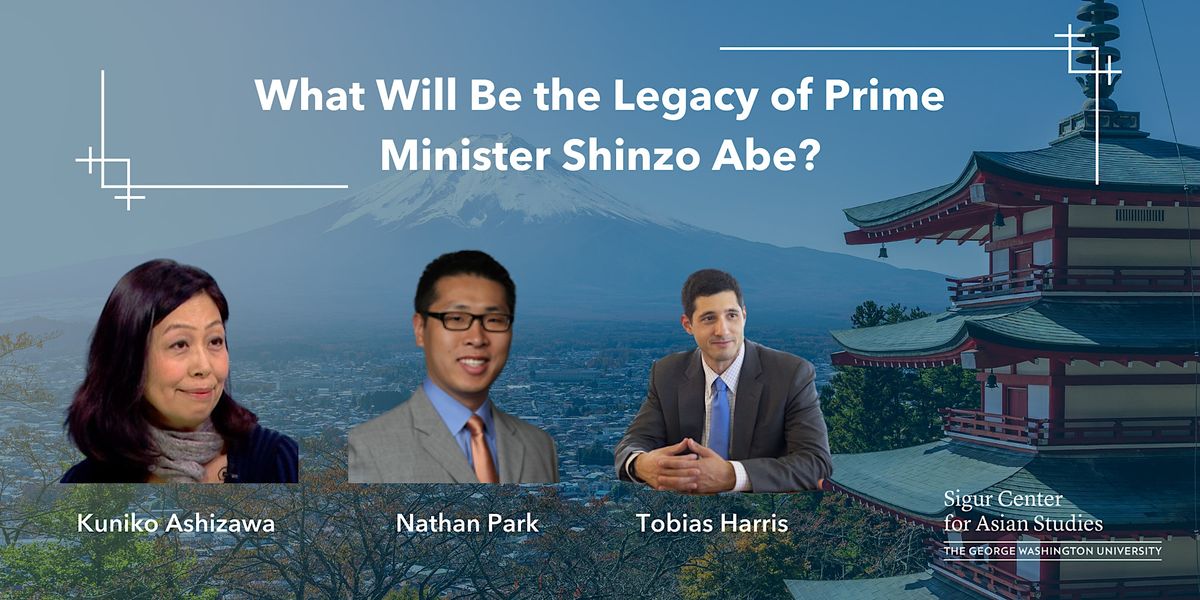What Will Be the Legacy of Prime Minister Shinzo Abe?
Schedule
Fri Sep 30 2022 at 12:00 pm to 02:00 pm
Location
Harry Harding Auditorium, 213 | Washington, DC

About this Event
NOTE: All non-GW affiliated attendees attending the event IN-PERSON must comply with in order to attend this event, including showing proof of vaccination and masking indoors. For frequently asked questions, please refer to .
Two months after Shinzo Abe’s assassination, Japan continues to grapple with the death of its longtime leader and controversies swirl around plans to hold a state funeral. Despite the polarization Abe brought to domestic politics, his efforts to connect Japan with its allies and neighbors in Asia and beyond will shape Japanese foreign policy for many years to come. What are Abe’s legacies? How did he shape Japan’s domestic and foreign policy? How should he be remembered? This panel discussion will examine the political, social, and economic impacts of Abe’s premiership on domestic and regional affairs through various perspectives.
Speakers
Kuniko Ashizawa teaches international relations and serves as Japan Coordinator of Asian Studies Research Council at the School of International Service, American University. From 2005 until 2012, she was a senior lecturer in international relations at Oxford Brookes University in the U.K. Her research interests include Japan’s foreign, security and development assistance policy, U.S.-Japan-China relations, regional institution-building in Asia, and the role of the concept of state identity in foreign policymaking, for which she has published a number of academic journal articles and book chapters, including in International Studies Review, Pacific Affairs, the Pacific Review, and Journal of Peacebuilding and Development. Her book, Japan, the U.S. and Regional Institution-Building in the New Asia: When Identity Matters (Palgrave McMillan, 2013), received the 2015 Masayoshi Ohira Memorial Prize. Ashizawa was a visiting fellow at various research institutions, including the Woodrow Wilson International Center for Scholars, the East-West Center in Washington, the Reischauer Center for East Asian Studies, SAIS, and the United Nations University (Institute of Advanced Studies) in Tokyo. She received her PhD in international relations at the Fletcher School of Law and Diplomacy, Tufts University.
S. Nathan Park is a versatile litigator who has handled every type of complex financial litigation, including cross-border matters involving securities and derivatives. He often represents Korea-based clients in connection with regulatory investigations involving U.S. and local authorities. He also has experience with international judgment enforcement and international arbitration. Mr. Park writes extensively on Asia's economy and politics and his work has appeared in The Wall Street Journal, Foreign Policy and The Atlantic. Before joining Kobre & Kim, Mr. Park practiced at Milbank, Tweed, Hadley & McCloy LLP and Cleary Gottlieb Steen & Hamilton LLP, where he represented clients in government enforcement defense, internal investigation, complex commercial litigation, securities litigation, international arbitration and international civil litigation.
Tobias Harris is senior fellow at American Progress, where he oversees the National Security and International Policy team’s work on Asia. From 2013 to 2021, he was a political risk analyst covering Japan and the Korean Peninsula at Teneo Intelligence, as well as a research fellow for economy, trade, and business at the Sasakawa Peace Foundation USA from 2014 to 2020. He is also the author of The Iconoclast: Shinzo Abe and the New Japan, the first English-language biography of Japan’s longest-serving prime minister. Prior to joining Teneo Intelligence, Harris worked for a Japanese legislator, authored the blog Observing Japan, and conducted graduate research at the Massachusetts Institute of Technology and the University of Tokyo. He holds a master's degree in international relations from the University of Cambridge and a bachelor’s degree in politics and history from Brandeis University.
Moderator
Mike M. Mochizuki holds the Japan-U.S. Relations Chair in Memory of Gaston Sigur at the Elliott School of International Affairs in George Washington University. Professor Mochizuki was associate dean for academic programs at the Elliott School from 2010 to 2014 and director of the Sigur Center for Asian Studies from 2001 to 2005. He co-directs the “Rising Powers Initiative” and the “Memory and Reconciliation in the Asia-Pacific” research and policy project of the Sigur Center. Previously he was a Senior Fellow at the Brookings Institution. He was also Co-Director of the Center for Asia-Pacific Policy at RAND and has taught at the University of Southern California and Yale University. He received his Ph.D. in political science from Harvard University. His recent books include Memory, Identity, and Commemorations of World War II: Anniversary Politics in Asia Pacific (co-editor and co-author, 2018);Energy Security in Asia and Eurasia (co-editor and co-author, 2017); Nuclear Debates in Asia: The Role of Geopolitics and Domestic Processes (co-editor and author, 2016); The Okinawa Question: Futenma, the US-Japan Alliance, and Regional Security (co-editor and author, 2013); China’s Military and the U.S.-Japan Alliance in 2030: A Strategic Net Assessment (co-author, 2013).
Where is it happening?
Harry Harding Auditorium, 213, 1957 E Street NW, Washington, United StatesEvent Location & Nearby Stays:
USD 0.00